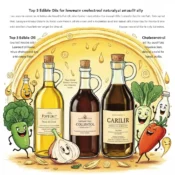
Is Canola Oil Healthier than Sunflower Oil? A Nutritionist’s Perspective
When it comes to selecting the best cooking oil, the dispute between canola oil and sunflower oil frequently emerges. Both are frequently used in homes, restaurants, and the food industry, and are valued for their nutritional value and range. But which one is actually healthier?
Nutritionists often compare the two to assist consumers in making educated dietary decisions as consumer demand for plant-based, heart-healthy oils rises. This article discusses and contrasts the nutritional characteristics, health advantages, and recommended applications of canola and sunflower oils.
The Basics of Canola and Sunflower Oil
Canola Oil
- Taken from canola seeds, which are a kind of rapeseed that has very little erucic acid in them.
- People like it because it has a light flavor, a high smoke point, and a good balance of nutrients.
- Used a lot in both home kitchens and big food factories.
Sunflower Oil
- One of the most common oilseeds in the world, sunflower seeds are used to make this.
- Known for its high vitamin E content, mild taste, and ability to stay stable when fried..
- A common ingredient in processed meals, frying, and salad dressings.
2. Nutritional Profile Comparison
Both oils are made up mostly of unsaturated fatty acids, but the ratios are different, which impacts how they affect health.
Fatty Acid Composition (per tablespoon)
| Nutrient | Canola Oil | Sunflower Oil (refined) |
| Saturated Fat | ~7% | ~10% |
| Monounsaturated Fat (MUFA) | ~63% | ~20% |
| Polyunsaturated Fat (PUFA) | ~28% | ~66% |
| Omega-3 (ALA) | ~9% | <1% |
| Omega-6 | ~19% | ~65% |
| Vitamin E | Moderate | High |
Health Benefits of Canola Oil
Heart Health
One of the heart-healthiest cooking oils is canola oil. Its high MUFA content and low saturated fat (less than 7%) help raise HDL (good cholesterol) and lower LDL (bad cholesterol).
Omega-3 Fatty Acids
Alpha-linolenic acid (ALA), a plant-based omega-3 that is essential for cardiovascular health, inflammatory management, and brain function, is present in it. Canola oil is special since few vegetable oils offer omega-3.
Blood Pressure Regulation
Some research indicates that canola oil can help in reducing blood pressure according to its optimal ratio of omega-3 to omega-6 fatty acids.
Weight Management
With fewer calories from saturated fat and a mild flavor, it is simple to add into healthy diets without controlling food.
Health Benefits of Sunflower Oil
Rich in Vitamin E
Sunflower oil is one of the best natural sources of vitamin E, which is a powerful antioxidant that helps the immune system, protects the skin, and keeps oxidative stress away.
High in Polyunsaturated Fats (PUFA)
Sunflower oil is rich in omega-6 fatty acids, which help in cells growth and overall metabolism.
Frying & Stability
Refined sunflower oil is great for deep-frying and cooking at high temperatures since it has a high smoke point. Unlike certain oils, it stays stable when heated for a long time, which lowers the amount of harmful substances that develop.
Skin & Cosmetic Benefits
Sunflower oil is often used in skin care products since it is moisturizing and has antioxidants.
Canola vs. Sunflower Oil: The Key Differences
1. Fatty Acid Balance
- Canola oil includes an excellent ratio of omega-3 and omega-6, which helps lower inflammation and keep your heart healthy.
- Sunflower oil has an excessive amount of omega-6 but not much omega-3. Omega-6 is important, but a surplus of it without omega-3 balance may cause inflammation.
2. Vitamin Content
- Sunflower oil is more dense in vitamin E, providing greater antioxidant protection.
- Canola oil has only small amounts of vitamin E, but it makes up for it with omega-3.
3. Cooking Versatility
- Both oils have high smoke points (~220-230°C), making them ideal for frying, sautéing, and baking.
- Canola oil's neutral flavor makes it more adaptable in recipes.
- People generally choose sunflower oil for cooking and salad dressings because it has a pleasant, nutty taste.
4. Health Impact
- Nutritionists commonly suggest canola oil for heart health since it has omega-3 fatty acids.
- Sunflower oil is advised for those who want to increase their vitamin E intake or for culinary uses that require flavor stability.
Industry and Market Perspective
In the global edible oil market, both oils are highly in demand:
- More and more people in Europe and North America are using canola oil because they want foods that are high in omega-3 fatty acids.
- In Asia, the Middle East, and Eastern Europe, where frying and traditional cuisine call for stable, vitamin-rich oils, sunflower oil is the most often used oil.
At Hi-Tech Edible Oils, we supply both refined canola and sunflower oils that are:
- Advanced refining technology is used to ensure purity and stability.
- Compliant with international export norms.
- Food manufacturers, distributors, and consumers throughout the world rely on us.
Nutritionist’s Final Verdict
From a nutritionist’s perspective, canola oil is generally healthier because:
- It provides omega-3 fatty acids, which most people lack in modern diets.
- It has a better fatty acid balance, reducing long-term inflammation risk.
- It supports heart health more effectively than sunflower oil.
But this doesn't mean that sunflower oil isn't good for you. It is still a great source of vitamin E and is very useful in cooking and industry.
What's the best approach? A balanced rotation of oils. Using canola and sunflower oils in different cooking ways allows you to reap the benefits of both.
Conclusion
Both canola and sunflower oils are beneficial in a balanced diet, with each providing distinct nutritional and culinary benefits. If you prioritize heart health and omega-3 intake, canola oil should be your first pick. If you're looking for a vitamin E-rich oil with outstanding frying stability, sunflower oil is a terrific choice.
Hi-Tech Edible Oils offers export-grade refined canola and sunflower oils that satisfy the highest global standards, ensuring consumer safety, nutrition, and quality.
The healthiest choice may not be one oil over the other, but the proper oil for the job.
All Categories
Recent Posts
Understanding Export-Grade Quality in Edible Oils
Top 5 Edible Oils for Lowering Cholesterol Naturally
+0123 (456) 7899
contact@example.com



